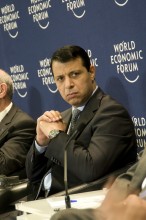Palestinian president acts only on internal dissent
Fatah Congress Clarifies Divisions in Palestinian Leadership
By Dalia Hatuqa, Al Monitor blog
December 06, 2016
Last week in Ramallah, Palestinian President Mahmoud Abbas gave a three- hour speech at the seventh congress of his Fatah party. The last time these members of the West Bank’s ruling political movement gathered was in 2009, in Bethlehem. In his remarks, which had an overwhelmingly casual feel and were interlaced with historical anecdotes and jokes, he called the congress one of “building and liberation…for getting to national unity.”
hour speech at the seventh congress of his Fatah party. The last time these members of the West Bank’s ruling political movement gathered was in 2009, in Bethlehem. In his remarks, which had an overwhelmingly casual feel and were interlaced with historical anecdotes and jokes, he called the congress one of “building and liberation…for getting to national unity.”
At 81, with a recent hospitalization, and almost 12 years into his elected 4-year term, Abbas is facing considerable domestic challenges. None of his oft-stated goals has been attained. He has no heir apparent, and shows no sign of stepping aside any time soon despite his growing unpopularity. In his speech, Abbas failed to outline a plan – other than negotiations that have so far yielded little – for ending Israel’s occupation of the West Bank and Gaza.
Under his leadership, Palestine gained non-member observer status at the United Nations, the main accomplishment the Palestinian Authority has obtained internationally. But things at home have soured since then. Bitter at the political stalemate, as Israel’s occupation enters its 50th year, while being subjected to heightening economic pressure, Palestinians’ criticism of Abbas and his inner circle has grown louder.
The congress itself – a gathering that is supposed to take place every five years to pump new blood into the ageing party – is long overdue. Held with the consent of the Israeli authorities, it was an opportunity for delegates to vote for 18 of the 21-member Central Committee (three are appointed by Abbas) and 80 members of the Revolutionary Council. These bodies are supposed to make decisions that will guide the party’s policy and strategy for the next five years, until the next congress.
Originally scheduled, like its predecessor, to be held in Bethlehem, the congress was moved to the Muqat’aa, Abbas’ presidential headquarters in Ramallah, an odd choice considering this is a party event – akin to a sitting Republican or Democratic administration holding its election year national convention at the White House.
Only 1,400 delegates were invited to attend, a number far smaller than the some 2,300 who partook in the 2009 congress, after allies of notorious ex-Gaza security chief Mohammed Dahlan, and other critics were excluded. Some chose to boycott the meeting, amid accusations that candidates for the elected positions were all handpicked by Abbas or his confidants, a charge denied by aides. Even in the lead-up to the meeting, some of Dahlan’s allies in the West Bank were arrested to prevent “any disturbances” of the conference proceedings.
During the gathering, Abbas was, unsurprisingly, re-elected to head Fatah. He lashed out at dissenters, praised loyalists and evoked the memory of the late Yasser Arafat, who is revered by Palestinians of all political stripes. Abbas also managed to sideline some of the party’s old guard, like Farouq Qaddoumi, a Fatah founder who accused him of conspiring to kill Arafat, by proposing to have them become permanent ‘advisory’ members of the Central Committee who can attend meetings but not vote. His proposal won the unanimous approval of the conference plenary.
While the congress consolidated Abbas’ power, it also showed Fatah to be weak, divided and lacking diversity. At least 12 members held onto their seats at the Central Council – and only one woman was voted into it – making it apparent that Fatah would not be headed in a new direction any time soon.

Two Fatah veterans – former West Bank security chief Jibril al-Rajoub, who currently heads the Palestinian Football Association, and jailed Second Intifada leader Marwan Barghouti – emerged victorious, winning the most votes in the election, setting them up for high-level roles within the party, or even as possible successors to Abbas.
To Palestine observers, the congress’ results were to be expected. In recent months, Abbas has focused on quashing internal dissent, especially in refugee camps like Balata and Am’ari that have become hotbeds of defiance to his rule.
Violent clashes between Palestinian security forces and camp residents have ensued, sometimes turning deadly. In August, two policemen and three gunmen affiliated with Fatah’s defunct Al Aqsa Martyr’s Brigade were killed in Nablus, and a fourth was beaten to death in police custody. His funeral, attended by thousands, turned into a protest against the PA.
Abbas also recently assigned members to the Palestinian Constitutional Court – a move that ensured he had the power to strip lawmakers, like Dahlan, of their parliamentary immunity. Last month, the court ruled to uphold the decree Abbas had issued in 2012 to kick Dahlan out of Fatah, after revoking his immunity.
With the congress’s conclusion, one thing has become obvious: Fatah is now split. Abbas will continue to crack down on Dahlan affiliates in some of the camps where he enjoys strong support, and Dahlan will have to decide whether he will hold his own (counter) Fatah congress as some reports have suggested he will do. And as the two wage this seemingly endless feud, Fatah, which is already at loggerheads with Hamas, continues to be weakened, while Israel’s occupation persists, and its settlements grow.
See also: Fatah totters into its 7th congress
